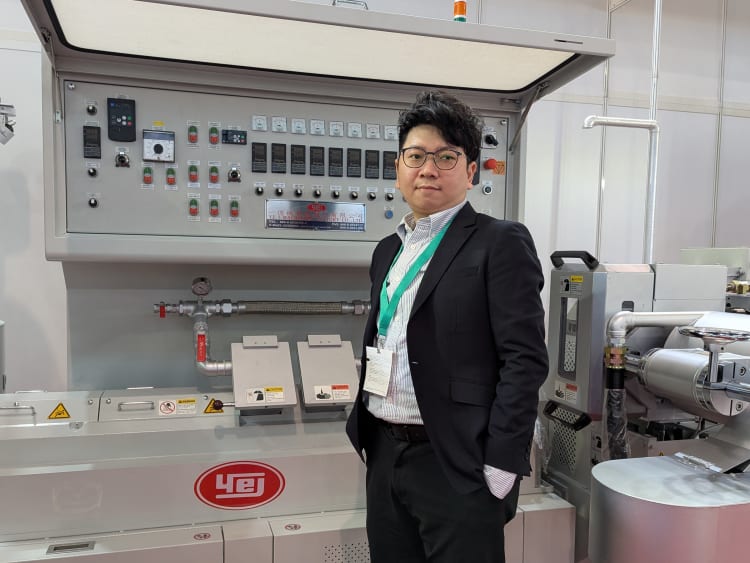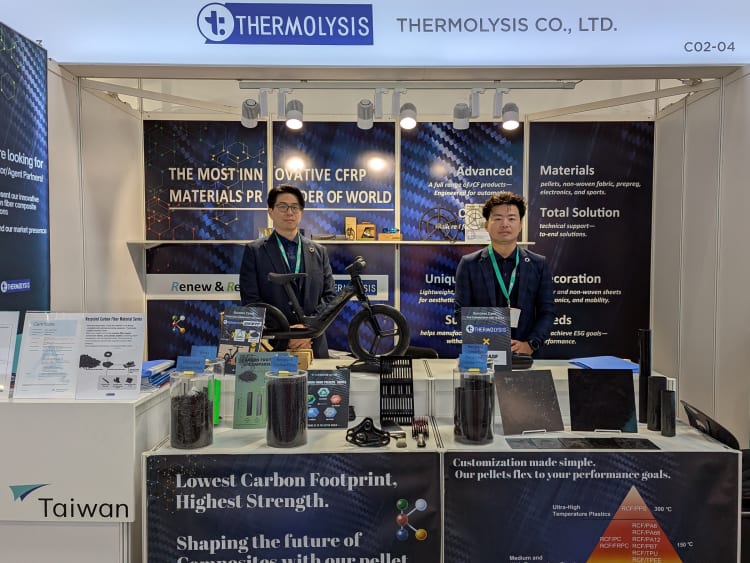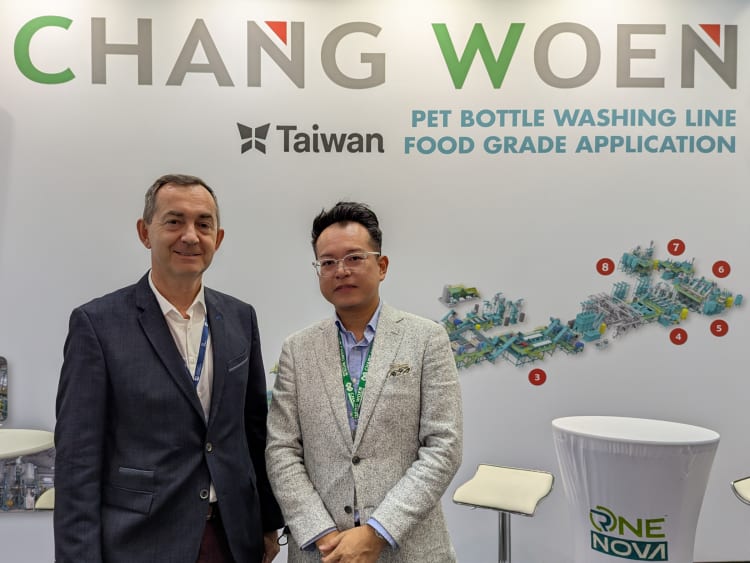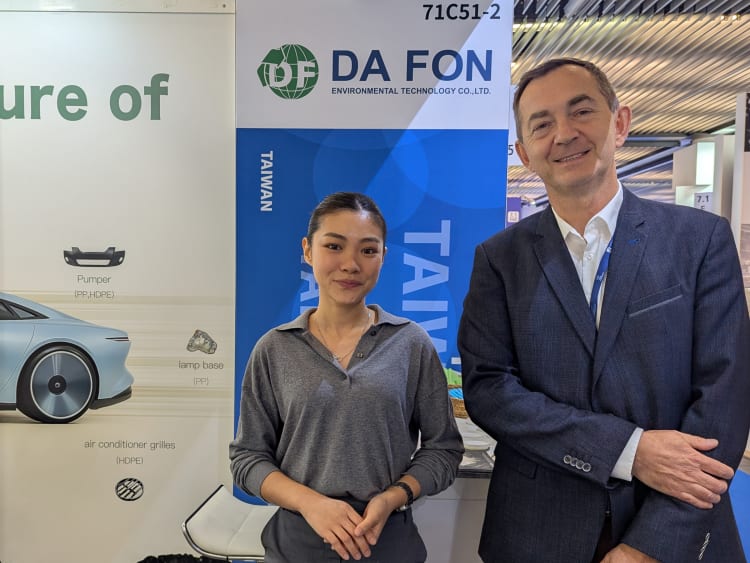
At the K 2025 trade fair, Taiwan showcased its strength in a distinctive way. More than 130 Taiwanese companies presented solutions in machinery, recycling, materials and automation, making Taiwan one of the most strongly represented non-European countries at the event.
The Taiwan Pavilion in Hall 12 drew visitors’ attention from day one, primarily with technologies aligned with the global development directions of the plastics industry - the circular economy, process automation, reduced energy consumption, closed material loops and the integration of recycling with production. Taiwanese manufacturers did not come to Düsseldorf simply to “show machines” but to join the global discussion on the future of plastics processing in a strategic way, presenting complete technology ecosystems that address the regulatory challenges facing the European market.

From film blowing to recycling
YE I Machinery Factory Co., Ltd. is among the oldest manufacturers of plastics processing equipment in Asia. With a history spanning over 65 years, its expertise covers both blown film lines and recycling systems. Today, YE I is regarded as a circular economy specialist - a supplier that combines capabilities in primary plastics processing and recycling to create a coherent in-house recycling model.
At K, the company focused on showcasing its flagship 3-in-1 machine, combining shredding, extrusion and pelletizing in a single process line. This configuration enables full recycling of soft plastics - mainly PE and PP - without separate equipment. A built-in filter with an automatic screen changer allows uninterrupted operation even during cleaning, and natural frictional heat pre-plasticizes the material, significantly reducing energy consumption. In practice, users save space, energy and time while obtaining high-quality regranulate. The process uses a water ring pelletizing system that gives pellets a smooth, uniform surface and minimizes fines.
YE I emphasizes investment not only in mechanical design but also in energy optimization and safety. Combined with low noise and a compact footprint, this allows the equipment to be used even in plants just beginning to develop in-house recycling.
YE I has been present in the European market for decades - in Poland through its representative, GG Plast Technology from Środa Wielkopolska. Partnerships like these have made the Taiwanese company recognized in Central Europe as a producer of economical, reliable recycling lines. Today, with the forthcoming PPWR and requirements for recycled content in new products, YE I’s solutions gain new relevance - helping processors establish their own material loops and reduce CO₂ emissions without investing in large, energy-intensive installations.

Kevin Hsu presents a 3-in-1 machine combining shredding, extrusion and pelletizing in a single process line, YE I Machinery Factory booth at K 2025
Carbon fiber in a closed loop
At K, Thermolysis presented Microwave-Assisted Pyrolysis (MAP) - one of the most advanced solutions for recycling carbon fiber reinforced composites. Instead of incineration or aggressive chemical methods, the company uses microwaves that selectively heat the resin within the composite, causing its depolymerization and separation from the fibers. The process is continuous, fully controlled and clean - without wastewater, flue gases or chemical waste.
MAP’s greatest advantage is the quality of the recovered material. The technology removes up to 99.9% of the resin, leaving fibers with an impeccably clean surface that retain over 90% of their original mechanical strength. This enables reuse in demanding industrial applications - from bicycle components and electronic parts to laptop housings and concrete reinforcement. Conventional recycling methods leave resin residues that limit adhesion and degrade properties, narrowing the scope of further use.
Thermolysis does not sell technology alone; it builds complete closed loops. The company collects composite waste from manufacturers, processes it via MAP and supplies it back as ready raw material. An example is its cooperation with Giant - waste from bicycle frames goes to Thermolysis and returns as reinforcing pellets used to make new bicycle components. This is a real, functioning circular economy model.
The company is also developing innovative applications. Adding short carbon fibers to concrete increases strength, crack resistance and improves antistatic properties. In seismic countries such as Taiwan, such micro-reinforcement can significantly extend the service life of structures. Thermolysis also produces nonwovens, pellets and thermoplastic semi-finished products which, at end of life, can be returned to MAP. This enables multiple circulation of carbon fiber in the value chain without losing key properties - something rare in high-tech materials recycling.

MAP technology uses significantly less energy than traditional methods and can cut CO₂ emissions by up to 90% compared with virgin fiber production. This is a tangible environmental advantage that helps companies meet ESG requirements and prepare for future regulations in automotive, electronics, aviation and sports.
Thermolysis deliberately focuses on short fibers - the most universal and easy to process. They can be used on standard injection molding machines without investment in specialized equipment. This opens carbon fiber to companies that previously avoided it due to cost or technical barriers.
Growing demand for lightweight, high-strength materials, along with increasingly stringent requirements for composite recycling, make Thermolysis’ solutions a potential key element in the industry’s transition toward a truly circular economy.
From washing to food-contact quality
Chang Woen Machinery Co., Ltd. is a Taiwanese pioneer in PET recycling and the design of complete washing lines. The company has operated since the 1970s, when it produced mills and shredders, but the real breakthrough came in the 1990s as surging plastic packaging consumption drove the development of cleaning and recovery technologies. Chang Woen was among the first manufacturers in Asia to introduce full PET bottle washing lines. Today, beyond PET, the company also supplies RDF (Refuse-Derived Fuel) systems and MRF (Material Recovery Facility) lines for sorting and recovery, integrating separation, washing and material preparation processes for a wide range of polymers.

Most Chang Woen machines are built in-house - from conveyors and friction washers to centrifuges and drying units. Where needed, the company also integrates external solutions such as TOMRA optical sensors or sorting robots, offering turnkey lines. This enables tailoring layouts to different conditions - from heavily contaminated streams in Southeast Asia to relatively clean European feedstocks.
Chang Woen’s key technological advantage is the FIFO (first in, first out) concept - every batch of material passes through the process for the same time and under identical conditions. To achieve this, the company developed the Planetary Wash reactor, combining the benefits of batch and continuous systems. It ensures uniform cleaning of each particle and full repeatability of parameters. The degree of cleanliness is measured in ppm, not “by eye.” Labels, adhesives and PVC, which initially amount to tens of thousands of ppm, are reduced to single-digit values, enabling food-contact quality.
Chang Woen is also developing proprietary automation and control systems based on PLC and SCADA with predictive analytics. Process data are recorded every few seconds, enabling efficiency and energy consumption monitoring and maintenance planning. In some plants, lines operate automatically at night without an operator. This is a level of digitalization comparable to automotive - recycling becomes intelligent, predictable and fully monitored.
The company is also working on a new technology for removing prints and inks from packaging films. It will allow printed fractions - previously of low value - to be converted into pellets with a neutral, white color. This will significantly increase recyclate value and reduce the volume of waste sent for incineration.
Experience gained from working with difficult feedstocks in Asia has enabled Chang Woen to develop systems with high tolerance to input variability. In Europe, the company cooperates with partners in the United Kingdom, Italy and Ukraine. Converters value process stability, parameter predictability and compliance with stringent standards - including food-grade applications.
From source separation to car-to-car recycling
DA-FON Environmental Technology Co., Ltd. illustrates how the circular economy can cover the entire value chain - from waste collection to ready PCR pellets. Founded in 2001 as a paper recycler, today it operates a complete ecosystem of 18 collection stations, sorting facilities and plastics reprocessing plants in Taiwan. It converts municipal and industrial waste into high-quality HDPE, LDPE and PP supplied to global FMCG brands.
The key to efficiency is close cooperation with city authorities and technology partners. In collaboration with Foxconn (FIH Mobile), DA-FON launched Asia’s first AI-enabled sorting center. The system identifies waste by shape and brand, and robots equipped with grippers separate PET, caps, milk containers and LDPE film. Identification accuracy of 89% delivers very clean material streams, which then go to plants that turn them into regranulates.
DA-FON produces HDPE and PP PCR for rigid packaging and LDPE for film and coatings, and is developing a new car-to-car segment. The company recovers plastics from end-of-life vehicle dismantling, cleans them mechanically and processes them into black PP that returns to production of interior car parts. In the context of planned ELV regulations in Europe mandating recyclate use in automotive components, this path may become a major growth area.

The company announces expansion in Europe. From 2025 it plans regular deliveries of REACH-compliant PCR, the launch of a warehouse, and, longer term, a local processing hub. For the Polish market - on the verge of fully implementing a deposit return system and reforming extended producer responsibility (EPR 2.0) - this means access to stable PCR volumes with verified quality and provenance.
DA-FON’s operating model combines all pillars of the circular economy: source separation, AI-based sorting, material regeneration and the return of material to the market as a ready product. The company shows that the circular economy does not end at a pelletizing line - it also includes resident education, logistics, data analytics and certified quality throughout the material lifecycle.
Although each of the four companies represents a different segment - from soft plastics recycling and carbon fiber recovery to complete washing lines and municipal systems - they share a common denominator. Thanks to industrial determination and cooperation between the private sector and public institutions, Taiwan has become a laboratory of the circular economy where CE solutions are developed not on paper but on production floors. It is these experiences of Taiwanese companies - YE I, Thermolysis, Chang Woen and DA-FON - that are enabling their technologies to enter the European market more boldly, giving converters tools to make the “closed loop” not a buzzword but daily production practice.
Author: Paweł Wiśniewski (Plastech)


